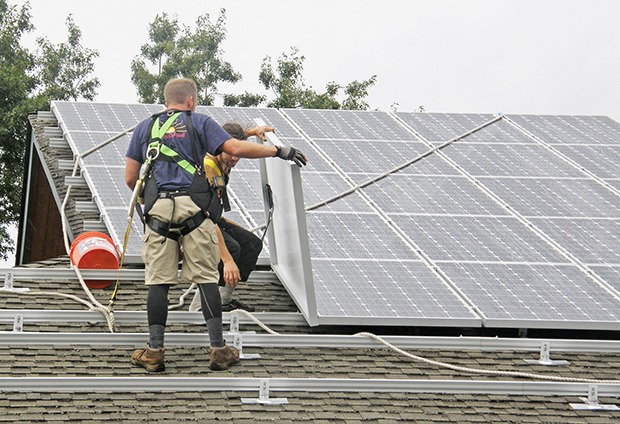When Bruce Alverson was in the process of building the Sun Break Café restaurant 15 years ago on A Street Southwest, he had his contractor pitch the south-facing roof at a 30-degree angle.
To allow solar panels to be installed there someday, Alverson said, when the technology had advanced.
Last Thursday, Alverson’s “someday” rose over the horizon, bright and sunny, as workers began installing the first of what will be 37 solar panels.
“This solar business is where it’s at,” Alverson said. “All the people are green, green is beautiful now, and solar is very green. So I want to attract all those beautiful green people.”
Alverson explained why going solar makes such excellent financial sense.
To encourage solar development, Alverson said, the state of Washington will pay him 54 cents per kilowatt hour to produce electricity. They don’t care what he does with it, he said, only that he produces it.
“They’ll put a production meter on to record everything that comes off the roof,” Alverson said. “Fifty-four cents a kilowatt hour — that’s 237 watts per panel, 9,900 watts of power — is roughly six times what we pay Puget Sound Energy. The state’ll pay that till June of 2020. So that is roughly $5,000 they’ll pay me to use solar.”
Plus, he said, the federal government has promised to give him a 30-percent tax credit against his income taxes.
And, if he uses solar panels and convertors that are developed within the state of Washington, there’ll be no sales tax.
“In my case, the system is $40,000, so that’s a savings of about $3,500 in sales tax,” Alverson said.
What’s more, he said, Puget Sound Energy plans to install a grid tie meter. The upshot is that on the days when Sun Break produces more than it uses, for example on Mondays when the restaurant is closed, the meter will spin backward. And that night, when the restaurant’s not using any solar energy, Alverson said he gets to bring that energy back in free.
“It’s a win win for everybody,” Alverson said. “Plus, I use about $900 worth of electricity every month, and I should be able to generate a good percentage of that on an annual basis. So my payout is about 4 1/2 years. All this is available through residential, too. We’ll recover all the heat given off by our air conditioning units, our refrigeration units and our ice machine. So, by using solar power to run the compressors for our refrigeration system and recovering that heat for our hot water, we will eventually become almost energy neutral.”
The University of Colorado, which has been testing the panels, Alverson said, has discovered that they should last through an 80-year cycle.
Alverson said he had been interested in solar energy for years, but the technology that actually makes it feasible was developed only in the last three to four years, and incentives are just now coming on line.
Two months ago, Alverson said, he attended seminars about solar energy at an energy fair put on by Mother Earth News at the Washington State Fairgrounds,
“I was on my way,” Alverson said. “Oh, boy!”
The installation was to have been done by Sept. 3.


